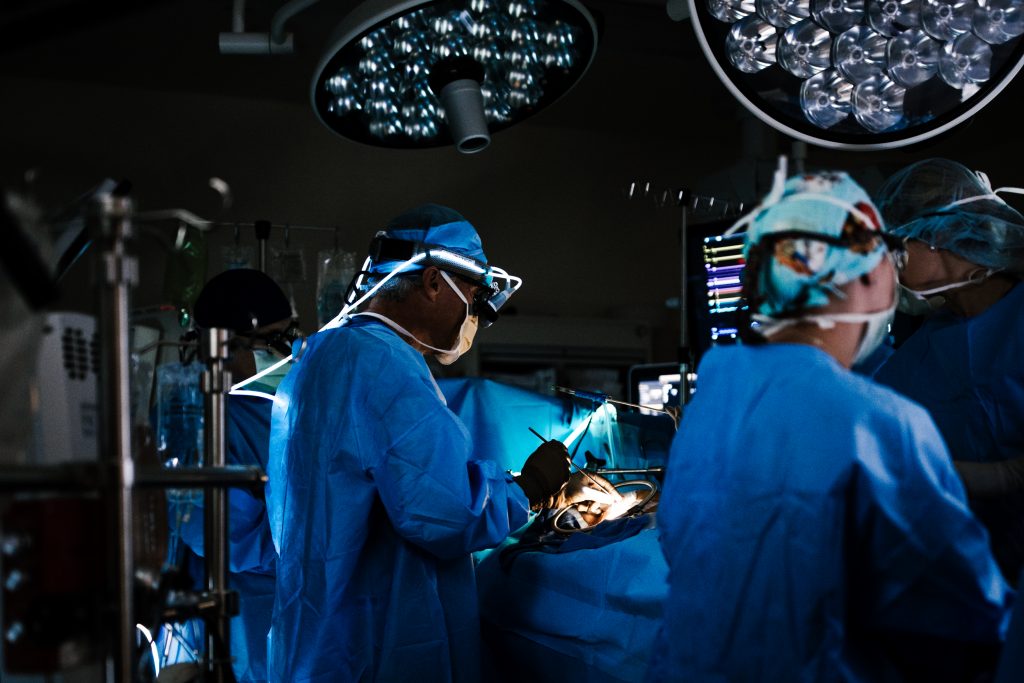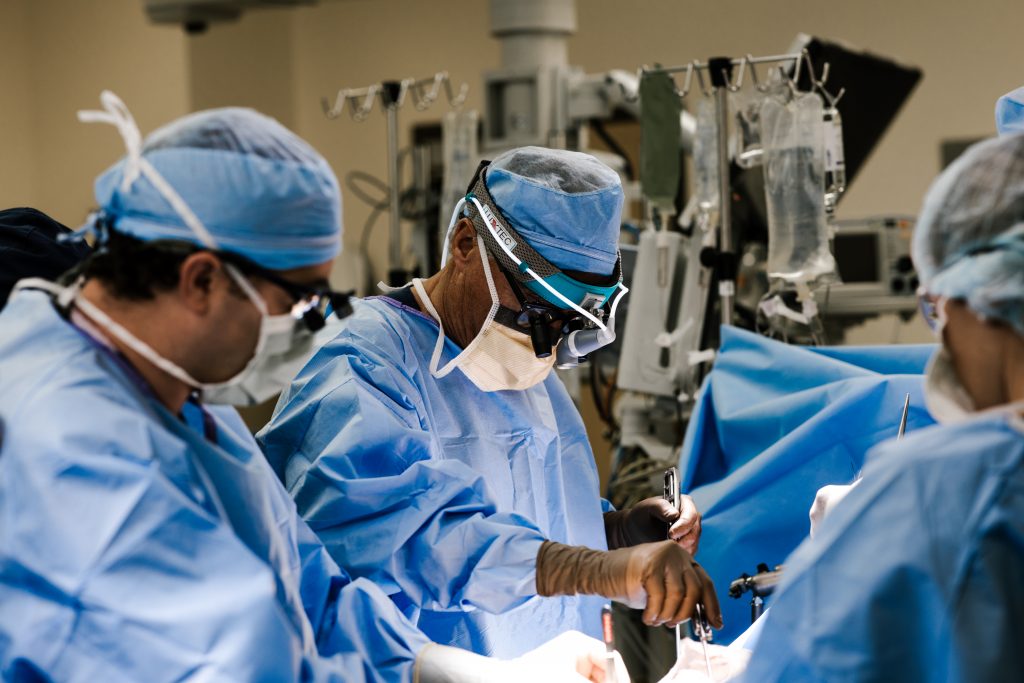Valvular heart disease occurs when one or more of the heart valves becomes damaged and/or works incorrectly. This includes a narrowing or stiffening of the valve (stenosis), improper closure of the valve (prolapse) or small amounts of blood flowing backwards or leaking (regurgitation). Our program offers surgery for:
- Aortic valve disease
- Mitral valve disease
- Tricuspid valve disease
- Pulmonary valve disease
To repair the valve defect, surgery can be performed with an open approach or minimally-invasive techniques, including robotic surgery. At Georgia Heart Institute, we offer one of the programs in the region with expertise in robotic valve repair and replacement. Our surgeons are leaders in robotic approaches with significant experience providing excellent outcomes in valve replacement and repair.

What is heart valve surgery?
When effectively treating a diseased or damaged heart valve, repair or reconstruction is the first choice as it protects the original valve and may help to preserve overall heart function long term. There are several innovative devices that may be used when repairing a valve, all of which are designed to strengthen and reinforce the valve and its leaflets/cusps.
There are several forms of valve reconstruction, which include:
- Annuloplasty: To tighten or strengthen the opening of the valve (annulus), a specialized ring-like device is placed around the valve.
- Reshaping: To ensure the valve can properly open and close, excess tissue is removed from the leaflets/cusps of the valve so they tightly close.
- Reconnecting: When there are gaps or tears in the valve leaflets/cusps, they are reconnected to allow the valve to properly open and close.
- Structural Cord Repair: The leaflets/cusps of each valve are supported by tiny cords and muscles, which work together to open and close the valve. Replacing or shortening the cords allow the valve to open and close properly.
- Commissurotomy: As a result of valve stenosis, the leaflets/cusps of the valve may become thickened and stuck, preventing the valve from properly functioning. Removing excess tissue allows the leaflets to fully open and close.
When disease or damage is extensive, a valve replacement may be the safest and most effective option. Utilizing only the latest valve replacement options, a mechanical valve or biological tissue valve may be used, both of which offer notable advantages.
Heart valve surgeries we offer
Open heart valve surgery
This procedure utilizes a sternotomy (opening of the chest through an incision along the sternum/breastbone), to provide the surgeon with direct and clear access to the chest and heart valve(s). In most cases, the valve surgery is performed using cardiopulmonary bypass, meaning that a heart-lung machine oxygenates and circulates blood throughout the body while the heart is stopped. Open surgery can be used to repair or replace any of the heart’s four valves (aortic, mitral, tricuspid or pulmonary).
Robotic heart valve surgery
We offer nationally-leading expertise in endoscopic robotic surgery for mitral valve, aortic valve and tricuspid valve disease. Rather than using a sternotomy that is performed in open surgery, minimally-invasive valve surgery uses small incisions (8 – 12mm) or ports (30 – 35mm) to access the chest and heart. In one incision, a specialized video scope is inserted to provide a clear and detailed image of the diseased valve. Through the other openings, the surgeon will use specialized instruments to repair the valve without distorting or moving the heart, so it stays as close to its natural state as possible.

Why choose Georgia Heart Institute for heart valve surgery?
There are numerous differentiators Georgia Heart Institute offers when it comes to valve surgery, namely outstanding clinical quality – delivered consistently. Recognized by the Society for Thoracic Surgeons, the surgeons of Northeast Georgia Physicians Group ensure excellent clinical outcomes as compared to national benchmarks.
Even more impressive, our cardiothoracic surgeons have received the highest rating of three stars for mitral valve surgical quality. Ultimately, this means that our patients experience fewer complications, have better outcomes and are discharged to home faster than patients who receive valve surgery at other hospitals throughout the country. We offer regional and national expertise in robotic mitral valve surgery, right here at home.
Minimally-invasive valve surgery is an extremely innovative procedure that’s not readily available through most heart and vascular programs. At Georgia Heart Institute, we have an experienced team that specializes in performing minimally-invasive and robotic heart valve procedures.
Even after the procedure, patients continue receiving exceptional and personalized care through our state-of-the-art cardiovascular intensive care unit (CVICU), the Ronnie Green Heart Center. While cardiac patients who underwent minimally-invasive surgery have a faster and easier recovery than open heart patients, specialized treatment and education during recovery plays a crucial role in long-term wellness.
FAQs
While valvular heart diseases are not as common as other types of heart disease, it is estimated that nearly 3 percent of US adults has some form of valvular disease and the risk of developing it increases with age.
To determine if open valve surgery is the best treatment option for a damaged or diseased valve, there are a variety of factors that may be considered. In addition to the overall health of the patient and their medical history, the surgeon will carefully evaluate key characteristics of their condition, including:
- Whether it’s causing symptoms that interfere with or affect quality of life
- The degree of damage or disease in the valve
- The presence of other cardiothoracic damage/disease
- Whether the patient has undergone past cardiothoracic procedures
There are many factors that may determine if minimally-invasive cardiac surgery is the best treatment option. In addition to the specific type and severity of the valvular disease, the patient’s age and their health history are important considerations. Most patients are a great candidate for robotic heart surgery, including those who are elderly or who carry higher risks, but that is a decision that your cardiothoracic surgeon will help you and your family make.
With an innovative approach to performing valve repair and reconstruction, robotic heart surgery offers several benefits as compared to traditional open surgery, such as:
- Smaller incisions (8mm – 2 inches vs. 6 – 12 inches)
- Little to no bone spreading (only soft tissue trauma)
- Shorter hospital stay, faster recovery and returning to normal activities more quickly
- Less pain during recovery
- Minimal scarring at the incision site(s)
- Decreased blood loss (requiring the need for transfusions)
- Decreased risk of infection
- At times, these surgeries can also be performed off-pump, which gives patients who are particularly high risk more options.
As with all types of surgery, robotic surgery does have limited risk. With a cardiothoracic surgeon and collaborative team of experts that fully understand all possible complications and risks related to the procedure, they actively take steps to prevent and avoid risks during and after surgery. Unlike traditional surgery, robotic surgery does not have any risks associated with a sternotomy and it has a lower risk of excess bleeding (requiring transfusions) and lower infection risk.
Robotic heart valve surgery has risks similar to open heart surgery, including:
- Bleeding/Blood clots (stroke/heart attack)
- Infection
- Pneumonia
- Pancreatitis
- Kidney failure
- Heart rhythm abnormalities
Following valve surgery, you will be taken to Georgia Heart Institute’s state-of-the-art cardiovascular intensive care unit (CVICU), the Ronnie Green Heart Center. There you will be closely monitored by a dedicated team of specialists to ensure that all vitals and readings are stable and healthy.
At first, you will likely be on a ventilator to allow the body to heal and to support breathing during the early stages of recovery, but you will then transition to self-sustained breathing. During this time, you may also notice chest discomfort and soreness, which is normal following surgery. Our cardiac surgical and recovery teams will help to provide guidance and support on how to perform breathing exercises that ease pain and minimize risk of pneumonia.
As you continue to heal, you will receive medications, therapies and assistance to support your recovery. In addition to the CVICU, you will receive care in the Cardiac Care Unit and from the Cardiopulmonary Rehabilitation team, all to keep you progressing through each stage of post-surgical recovery and back home.
All patients should expect a 1 – 5 day hospital stay, with robotic heart surgery patients typically discharging sooner. After you return home, robotic heart surgery patients will experience a fuller recovery in 1 – 2 weeks, while open heart surgery patients should expect a recovery of 2 – 5 weeks.
Next Steps
Patients
Referrals are required for surgical services, but our knowledgeable team is always happy to answer your questions and provide next steps. Call 770-219-7099 to discuss your surgery with our team.
Referring Clinicians
If you are a clinician who needs to refer a patient for cardiothoracic surgery, please contact our program directly at 770-219-7099. Our program coordinator can answer any questions you have and help schedule your patient to see one of our board-certified cardiothoracic surgeons.

